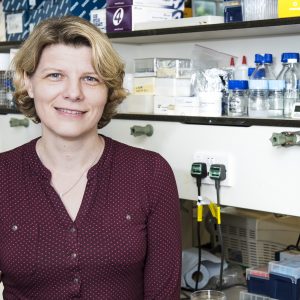Dr Susan Schlimpert
Group Leader Royal Society University Research Fellow Harnessing Biosynthesis for Sustainable Food and Health (HBio)
Susan is interested in the molecular mechanisms that spatially and temporally control cell division and cellular organisation in bacteria.
She is particularly interested in every aspect of the biology of the filamentous antibiotic producing bacteria Streptomyces.
Her group uses a combination of cell biology, molecular genetics, biochemistry and global ‘omics approaches to investigate the molecular basis that allow Streptomyces to grow as multicellular organisms and to divide into unicellular spores.
Dr Schlimpert’s group uses Streptomyces venezuelae as a model system for developmental studies in filamentous growing bacteria. The research in her group focuses on:
- Cell division and sporulation
- Regulation of multicellular development in bacteria
- Cell differentiation
Cell division is an essential process for every cell in order to grow and propagate and one of the fundamental questions in biology is to understand how cells determine when and where to divide.
Most of our knowledge about bacterial cell division comes from studying a handful of unicellular model organisms. However, much less is known how filamentous bacteria, like Streptomyces, grow and divide.
Streptomyces have a complex life cycle that is characterized by two functionally distinct modes of cell division, sporulation-specific cell division and vegetative cross-wall formation.
Dr Schlimpert’s research aims to unravel the mechanistic details that control both division events in space and time and how cell division and multicellular development is coordinated with other cellular processes such as chromosome organisation and antibiotic production.
The outcome of this research will provide fundamental new insights into bacterial cytokinesis and multicellular development.
Furthermore, Streptomyces are renowned producers of over 50% of all clinically used antibiotics and numerous other bioactive molecules. The production of these industrial and medical important compounds is tightly coordinated with the Streptomyces life-cycle.
Therefore a comprehensive understanding about the biology of Streptomyces may also aid in the development of novel experimental strategies to improve antibiotic production in these important bacteria.
Selected Publications
-
Schlimpert S, Elliot M (2023)The Best of Both Worlds-Streptomyces coelicolor and Streptomyces venezuelae as Model Species for Studying Antibiotic Production and Bacterial Multicellular Development.Journal of bacteriologyPublisher's version: 0021-9193
-
Casu B, Sallmen JW, Schlimpert S, Pilhofer (2023)Cytoplasmic contractile injection systems mediate cell death in Streptomyces.Nature microbiologyPublisher's version: 2058-5276
-
Bush MJ,Gallagher KA,Chandra G,Findlay KC,Schlimpert S (2022)Hyphal compartmentalization and sporulation in Streptomyces require the conserved cell division protein SepX.Nature communicationsPublisher's version: 2041-1723
